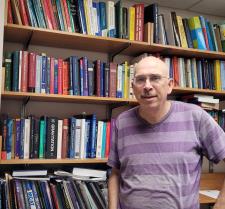The total energy transferred to the water in 40 min is
H = Q/t = (100 kg)(4186 J/kg)(90-20)/(40*60s) = 12,209 W
This energy comes from the steam inside the coil.
We need the inside and outside area of the coil:
A =2*Pi*r*L
Ain=2*Pi*(0.02174/2 m)(12 m) = 0.8196 m²
Aout=2*Pi*(0.0254/2 m)(12 m) = 0.9576 m²
For the thermal conductivity of copper at about 100°C I found k=400 W/m/K.
We have convection inside and outside the coil and conduction within the coil.
On the steam side,
H = hs Ain (100-Tin),
12209 = 12000 (0.8196) (100-Tin)
which gives us 100-Tin=1.24, Tin=98.76 °C
For the conduction within the copper coil, modeled as a pipe, we have the formula
H = 2*Pi*L*k*(Tin - Tout) / ln(rout/rin)
12209 = 2*Pi*12*400*(98.76-Tout)/ ln(2.54/2.174)
which gives us 98.76-Tout = 2.60, Tout= 96.16 °C
On the water side,
H = hw Aout (Tout-55)
( I took (20+90)/2=55°C as the average water temperature.)
12209 = hw 0.9576 (96.16 -55)
which gives us hw=309.7 W/m2/K
(a) Now suppose this hw doubled to 2(309.7)=619.5 W/m²/K. With all other conditions staying the same, H would also double, so the heating time would be cut in half to 20 min.
(b) Re-do the entire calculation with 150 °C instead of 100°C - I will leave that to you.
Nadeshiko Y.
does the thermal conductivity of copper at 150C same with 100C?
Report
10/28/13

Andre W.
tutor
Yes, it's still about 400 W/m/K.
Report
10/28/13
Jane S.
If all you did was double H and resolved for the time using the H=Q/t equation than why did you solve for hw?
Report
11/12/13

Andre W.
tutor
Because you need hw to do part (b) of the problem.
Report
11/12/13
Jane S.
How would you calculate the total condensate flow rate of the steam as the water is
heated?
Calculate the total condensate flow rate of the steam as the water is
heated.
Report
11/13/13


Nadeshiko Y.
10/28/13